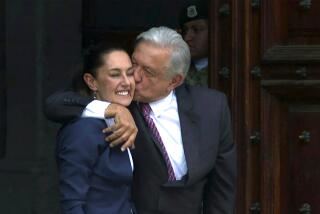Peronists Confident of Argentine Victory : Party OKs Moderate Campaign Platform in Bid to Ensure Presidency
- Share via
MAR DEL PLATA, Argentina — The resurgent Peronist party, seeing the presidency within its grasp, has endorsed a moderate campaign platform, abandoning the party’s long-held conviction that the state should dominate the national economy.
Flamboyant Peronist candidate Carlos Saul Menem spoke in a weekend interview with the restraint and confidence of a front runner who is convinced that he needs merely to avoid major gaffes to win the May 14 election.
Menem pledged a “productive revolution” through a balanced partnership between business, workers and the government that he said would restore confidence and win back labor’s lost share of the nation’s economic output. He declared that in the 45 years since the late Gen. Juan D. Peron founded the worker-based movement, “the world has changed, and (Peronism) is adjusting its policies to these changes. We are eminently pragmatic.”
With the economy disintegrating under President Raul Alfonsin’s ruling Radical Civic Union, the Justicialist Party--the Peronists’ formal name--leads in opinion polls. Menem appears likely to become the first Peronist other than Peron to win the presidency in his own right.
Volatile History
Menem’s lead has narrowed somewhat in recent weeks as the Radicals stoke fears about his ability and about the volatile, authoritarian history of Peronism, with its penchant for government control over the nation’s economic life. Radical politicians have cited seeming contradictions in Menem’s stump speeches as evidence of his lack of stature to govern.
“I don’t make errors,” Menem replied. “The Radicals take out of context what I say, they make a campaign of following me. Wherever Carlos Menem goes, they send journalists--paid, of course, nobody doubts it--and tape me and take out of context what I say.”
A 54-year-old lawyer and three-time populist governor of tiny La Rioja province, Menem has often been photographed with pretty women and, in one recent magazine spread, lounging on a bed in a bathing suit and embracing the family dog. He wears the long hair and sideburns of a 19th-Century Latin American caudillo , or provincial warlord, and races cars in his spare time, to the delight of his working-class and rural followers and the chagrin of his urbane foes.
“I prefer this style, which is Argentine, rather than a mustache like the president (Alfonsin), which is European,” Menem said with a smile. “Anyway, why should I change if, as I am, I have been a winner? I have never lost a single election in my life. . . . This is like discussing whether (former President Ronald) Reagan has dyed his hair. This is my personality, and no one is going to change my personality. And the people love me as I am.”
Argentina’s daily electric power cuts, bank lending rates of 30% a month and the near collapse of the government’s latest economic plan have conspired against Radical candidate Eduardo Angeloz, the efficient but dour governor of Cordoba province. Angeloz is running as much against Alfonsin’s policies as against those of Menem.
New-Found Unity
The Peronist party congress in this middle-class Atlantic coastal resort, and the speeches at a rally attended by more than 40,000 supporters Friday night, underscored the party’s self-declared realism and its new-found unity.
The party platform, approved unanimously late Saturday night, stresses the need to end the concentration of power in the central government and to halt “the effort by the state to manipulate all the relations of social collaboration.” It says the state has “imprisoned private business activity in detailed regulation, without managing to control the rational and effective use of national resources.”
In seeking the nomination, Menem had hinted that he would support a five-year moratorium on foreign debt interest payments, blaming the $58-billion debt for Argentina’s economic stagnation. He later accepted the view of rival Peronists that confrontation would simply ensure that no new money comes into Argentina.
The platform criticizes the demands by the International Monetary Fund for domestic belt-tightening and urges negotiations for a “grace period” in which debt payments would be suspended. During that time, Argentina would invest its export earnings, allow growth to resume and thus enable repayment in the future.
The platform adds, however, that “international experience shows that . . . the road of a unilateral moratorium or repudiation of the debt, just as much as the unconditional acceptance of the recessive prescriptions of the IMF, has proved incapable of encouraging growth.”
‘We Can’t Work Miracles’
Menem told The Times: “We are aware that we have to fulfill our international obligations, but at the same time we must be permitted to grow. We can’t pay, we can’t work miracles, if there is no creation of wealth.”
Argentina has already fallen more than $2 billion behind in its payments in the past year, when inflation exceeded 300% and the government budget deficit hovered around 7% of the gross domestic product, mainly because of inefficient state-owned industries. Peron, who ruled from 1944 to 1955, and again briefly in 1973-74, began the government takeover of industries, and the trend has persisted during other governments, military and civilian.
Menem said the Justicialist Party recognizes the need to privatize some government-held industries, although he declined to specify them--one of several areas in which he declined to disclose what concrete steps he plans.
“We will privatize those industries that should be privatized, through clear and open bidding, and submit these proposals to Congress for approval,” he said.
Menem is an amiable outsider who derives his following from his charisma and contact with the people. He is especially strong in poorer, rural areas, where he campaigns tirelessly in his “Menemobile,” a luxury bus with a speaking platform on top.
Aid from Ex-Rival
Menem upset the powerful, sophisticated governor of Buenos Aires, Antonio Cafiero, in the party’s first open primary last July. Cafiero, however, now campaigns regularly with Menem and has put his extensive political machinery to work for his former rival, in return for concessions in party policy such as the more moderate language on debt.
The platform also endorses constitutional reform, including the reduction of the presidential term from six years to four, with the possibility of reelection (now forbidden). The changes would include the creation of a prime minister’s post to distribute executive power and to encourage compromise, not a common Argentine trait, in Congress.
Alfonsin won a surprise victory over the Peronists in 1983 after a harsh seven-year military dictatorship, in which at least 9,000 people disappeared and were presumed killed. Menem spent five years in jail and under house arrest during that period.
Along with the dire economic crisis, Alfonsin has faced three military uprisings since April, 1987, demanding amnesty for officers convicted of human rights abuses. The first major left-wing violence since civilian rule was restored occurred in January, when guerrillas attacked a military garrison, leaving 39 attackers and soldiers dead.
Nevertheless, neither Alfonsin’s Radicals nor the Peronists doubt that Argentina will hold the election and transfer power peacefully from one elected president to another for the first time in 60 years.
More to Read
Sign up for Essential California
The most important California stories and recommendations in your inbox every morning.
You may occasionally receive promotional content from the Los Angeles Times.













